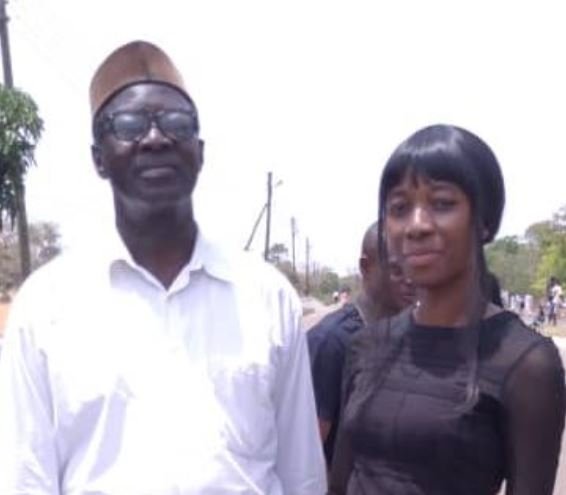News
Former Dean, 68, in same law class with daughter Wonders, the sages say shall never end.

Some people say life is all about nursing and adding value to it to build and gain an incorporated image in society.
It is also said that age is just a number and must not serve as a barrier to people who seek to pursue their long-cherished dreams by going into new areas to acquire knowledge.
With this in mind, a former Dean of Business, Education and Law at the University for Development Studies, Wa Campus, Professor Daniel Bagah, 68, a foundation layer of UDS and former Upper West Region’s Council of State member has enrolled to venture into the legal field to study law at SDD-UBIDS this academic year.
The surprising thing about Professor Bagah going to read law is not about his age, but that he is sitting at the backline of his third daughter in the same class for lectures to the admiration of the young ones in lecture halls and some of the lecturers he handled at the university.
When Professor Emmanuel K. Derbile, Vice Chancellor of the SDD-UBIDS announced the name of Professor Bagah among the ‘freshers’ for the 2024-2025 academic year to pursue LLB, there was an uproar among the students and some lecturers alike about the news.
Talking to Professor Bagah in an interview, he said the legal field had been his long-cherished dream, which was about to elude me but time has come for him to venture into new areas to acquire new knowledge.
“I believe in getting to new areas of knowledge and throughout my studies, my first, second and third degrees, I have not been able to do law, which is a new area for me. My age is nothing to me, it is my intention to challenge the young lecturers and students to emulate me and go into the legal field to know of their human rights and the rights of other people.
“For the few days that I have been lectured, I have realised that I had trampled on so many people’s rights ignorantly, even during communication with others l wrong them,” he said.
Professor Bagah, therefore, advocated basic law to be taught at all tertiary schools in Ghana to open the mindsets of the students to know about their rights and the rights of others, as well as defend the country patriotically.
He appealed to the people of northern Ghana to take advantage of the Law School to improve their lives since the school is the first law school in the north.
Miss Portia Bagah, 24, said her degree was in Estate Management and her dad had been an inspiration in her life, encouraging her to pursue the law programme.
She said the presence of her father in class serves as motivation and challenge to her and not a setback like others might be thinking. –GNA
News
Prioritise affordable treatment of sickle cell treatment —Health Expert

Health experts have urged Ghana to prioritise affordable and accessible treatment for sickle cell disease (SCD) as advanced, but costly curative therapies remain out of reach.
SCD, an inherited blood disorder, affects about three in every 100 newborns in Ghana.
Globally, around 1,000 babies are born with the condition daily, with three-quarters in sub-Saharan Africa.
The disease causes severe complications including chronic pain, anaemia, infections, strokes and organ damage, often leading to shortened life expectancy.
In recent years, gene therapy has been developed as a potential cure.
However, its cost—running into millions of dollars per patient—makes it financially and technically inaccessible in Ghana.
According to Dr Lawrence Osei-Tutu, a Sickle Cell and Childhood Cancer Expert at the Komfo Anokye Teaching Hospital, “the country must instead focus on practical, lower-cost interventions such as hydroxyurea”, a decades-old cancer drug proven to reduce painful episodes, hospitalisation and life- threatening complications in SCD patients”.
Taken orally, the medicine improves red blood cell function and is considered safe and effective.
“Hydroxyurea therapy is as good as the cure and a low-hanging fruit to pluck, we must bring a cure to our sickle cell warriors, but do so sustainably.” he urged.
In a chat with The Spectator here, he said to create awareness on the disease, the expert noted that despite its benefits, “hydroxyurea is not widely accessible in Ghana.”
Stressing that, “many patients either cannot afford it or struggle with irregular supply through the health system.”
Moreover, he argued that scaling up access would provide immediate relief while the country builds the infrastructure, trains specialists and secures funding needed to support curative therapies in the future.
With an estimated 15,000 babies born with sickle cell disease annually in Ghana, Dr Osei Tutu cautioned that “failure to improve access to effective treatment will leave many patients vulnerable to preventable complications and early death.”
From Kingsley E. Hope, Kumasi
Join our WhatsApp Channel now!
https://whatsapp.com/channel/0029VbBElzjInlqHhl1aTU27
Hot!
Let’s reintroduce Cultural Studies to complement educational reforms — Tourism Minister

Madam Abla Dzifa Gomashie, the Minister of Tourism, Culture and Creative Arts, has emphasised the importance of reintroducing Cultural Studies in schools as part of Ghana’s broader educational reform agenda.
She said Cultural Studies would complement existing efforts to reposition Science, Technology, Engineering and Mathematics (STEM) and Technical Vocational Education and Training (TVET) to promote digital literacy and expand Creative Arts education.
Speaking at the 2025 Homowo Festival of the people of Ningo-Prampram, held on the theme: “Education: The Best Legacy for our Children,” Madam Gomashie said cultural education was critical to national identity and development.
She noted that the festival’s theme aligned with the Government’s vision to transform education in Ghana and encouraged the youth to embrace it not only as a means of personal development but also as a way of preserving traditional values.
These values, including patience, wisdom, and hard work, were at the core of the Homowo celebration, the Minister said.
“Cultural festivals like Homowo are vital instruments for strengthening cultural identity, preserving historical memory, and fostering national unity. Additionally, festivals serve as platforms for educating the youth through storytelling, music, dance, and other traditional practices, while also providing opportunities for community engagement.”
Madam Gomashie highlighted the strong foundation that Ghana’s tourism was built on, which included culture, traditions, and the creative industry, collectively contributing to over GH¢4.8 billion to the economy.
“Festivals give tourists reasons to visit our country. Therefore, with the right infrastructure and the development of all the domains, the sector can do more than what has been recorded,” she added.
Mr Sam Nartey George, the Member of Parliament for Ningo-Prampram and Minister of Communication, Digital Technology and Innovation, commended the community for their vibrant participation in the festival. He announced plans for the construction of a new nursing training school in Ningo, aimed at expanding access to healthcare education in the area.
Nene Osroagbo Djangmah XII, Paramount Chief of Great Ningo Traditional Area; King Dr Tackie Teiko Tsuru II, Ga Mantse; Nene Tetteh Wakah III, Paramount Chief of the Prampram Traditional Area; Prof. Odaifio Welentsi III, Paramount Chief of the Nungua Traditional Area; Naana Dugbakuwor Dugba II, Paramount Queen Mother of Great Ningo; and Mr. Elvis Afriyie Ankrah, Special Envoy on Religion and Inter-Faith Affairs, who represented the Chief of Staff, were among dignitaries at the festival. -GNA














